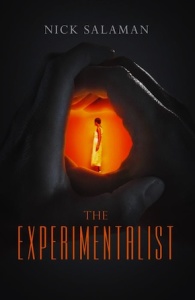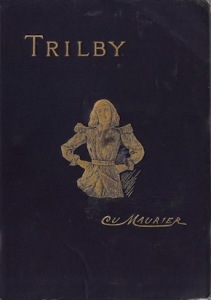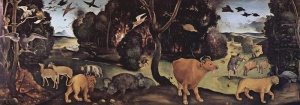Puppetmasters
by Nick SalamanDo you ever have the feeling that somebody or something is influencing your life in some way? Making you do the foolish things that you know you really shouldn’t, providing snakes where in fact you should be going up ladders? You’re quite right. There is. The somebody is you, programmed to do what you do because you are you. But is that all the story? Who is the programmer? Is it those inexorable genes, slightly dominant from the father’s side, giving you blue eyes and dark hair and a charming very slight lisp when you speak, making you shy but critical, slow to anger but watch out when it happens? Is it nature or nurture? Or is there someone else pulling the strings of your life, even though you are not aware of the perpetrator or his purpose. Of course, there are many who exert a slight influence, tweaking here and there, now and then. There are such people about, politicians, for instance; priests; your parents; your preacher, your teacher; your husband or your wife; your siblings; your friends; your lovers; your magazines and the books you read; and the astrologer round the corner. All perfectly natural and healthy, as my headmaster used to say. But what really interests me are the unseen puppetmasters whose pleasure lies in the power they exert. These people send others to their destiny with the subtle finesse of a master of marionettes and the compunction of a snake-charmer, and appear in some of the books I have most enjoyed, controlling the motivation and the action like God himself. Sometimes this is directly as with Iago in Othello, the jealous underling intent on overthrowing his master. But sometimes the schemer achieves his effect by setting a dark cast that prevails throughout the story.
1. Genesis, chapter 3
How masterfully God controls the action in the Garden of Eden, making it a really beautiful place for his two new creatures, watering the apple tree, sitting in it alongside the serpent who can’t see him, walking in the garden in the cool of the day like the planter he is, probably wearing a panama hat. Making his created children agog at the mention of something they must not do. Fatal, as every parent knows. For the garden is beautiful and dull. What he has created is little more than two upright animals. They want to do more than wander around admiring things. He gave them snakes but no ladders. When they disobey, at least he gives them the fun of introducing them to clothes, but then the alarming voice of the schoolmaster rings out: “Has thou eaten of the tree whereof I commanded thee that thou shouldest not eat?” He knows damn well they have. He is blaming them for his mistake in limiting their potential. Of course they are going to be expelled. They have sinned but at least it’s original. And now God has to stand back a bit and let them get on with it.
2. Trilby by Gerald du Maurier
The scene is set in the 1850s, in Paris, where gaiety had a bohemian tinge, and gay had its original meaning of blithe and happy as the night was long and the garret was warm. The lovely, bright and bubbly Trilby O’Ferrall, loved by all, is in thrall to the dark and sinister Svengali, a musician and hypnotist. She can sing like a linnet when she is hypnotised but is tone deaf in reality. No one quite knows the secret of his power. The hero is a good man who falls in love with her but he cannot save her. She is lost. But something good came out of it all: the trilby hat.
3. King Lear by William Shakespeare
The Bastard Edmund declares his baleful influence in King Lear within minutes of the start:
“Thou, Nature, art my goddess.”
He has set Nature in motion, Nature red in tooth and claw, Nature that cares nothing for the order that man constructs to try and mitigate a cruel world. He praises bastards whose fathers “in the lusty stealth of nature take more composition and fierce quality than doth, within a dull, stale, tired bed, go to the creating a whole tribe of fops.” In Edmund’s new world, daughters turn on their fathers and sons have their dads blinded, the divided kingdom falls apart, storms rage and man goes naked, hospitality is turned into captivity, prisoners are summarily hanged. As Gloucester ruefully remarks, “’Tis the time’s plague when madmen lead the blind.” It is only when Edmund is fatally wounded that the healing processes of nature are finally allowed to start, and even then the innocent victim and the deluded author of her fate must first die. Sad, but that’s tragedy for you.
Karswell’s mistake is to think he can call up powers of darkness without them coming back to punish him. This is what happens in Cambridge if you offend the Master during a College Feast.”
4. ‘Casting the Runes’ by M.R. James from the collection Stories of an Antiquary
James’s characters are either good dons or bad dons. Drawing considerably on his experiences of Cambridge, his attitude to his characters is rather like that of a College President or Master. He has no executive power, but he has a major role of consultation and advice, and his characters dance to its tune. Mr Karswell is a bad don, and his badness shows in his suddenly making an appalling, squirming, writhing fecundity of snakes and foul creatures start spilling out of the screen at a magic lantern show for children in the village hall. Quite funny if you dislike children but not a big gas otherwise. His nastiness established, Karswell is affronted by the hero who writes a review criticising his scholarship and mocking him to his peers. In revenge, Karswell passes our hero a rune written on a slip of paper without him noticing, to send a fearful hellish presence to destroy him. But Karswell’s mistake is to think he can call up powers of darkness without them coming back to punish him. This is what happens in Cambridge if you offend the Master during a College Feast. Walking home you will experience a growing feeling of unease, a feeling that turns to dread and then as you hurry forward, you can’t help taking a backward glance, and there… but I won’t go on. You never know who’s feeling rune-ish, do you?
5. The Owl Service by Alan Garner
Nature is again the presiding genius. But this time it is the two faces of Nature that loom like an April day over the landscape – sunshine and storm. The imagery is taken from an old dinner service which reflects the Welsh legend of Blodeuwedd. It is taken to represent the two faces of Nature – one that is fertile and beautiful, the other that rends and destroys. The pattern on the china is either a flower or an owl depending on how you look at it – the owl representing the violent face of Nature, the flower the benign one. The children in the story are caught up in the intriguing and disturbing tension between the two in a re-enactment of the legend that seems to be built into the fabric of the house and the valley itself. It is this legend, like a recording in stone, that controls the energy and doom of the action.
6. The Forest Fire by Piero di Cosimo
It is said by Michael Levey that Piero had an affinity with outcasts, and this painting in the Ashmolean Museum in Oxford seems to me to bear it out. A fire rages in a wood in the background from which all manner of animals are emerging, cows, sheep, boars, birds. It is a splendid picture full of colour and movement and otherness. Some of the animals in the foreground, a pig and a sheep, for instance, have human faces. It is thought the owners of the faces may be princely friends of Piero, a sort of in-joke such as friends might play on a prince, and possibly do, but the overall effect the picture has is one of displacement. The human faces add to this – they too are outcasts. The wood is home. The humans have no place there. Where is their place? Cosimo throws his web over the whole scene to make us feel sympathy with living creatures, so vulnerable to Nature and to Man, and to wonder who will protect us when our home burns, how will we escape, and what will we do when are turned out into the storm.
7. Great Expectations by Charles Dickens
There are two mysterious forces at work on Pip’s life. One lurks in the background like a benign deus ex machina, the other plays Pip the hero like Punch and Judy for he is but a man (even if he is a boy) and therefore to be punished. I am taking of course about Magwitch the good convict and of Miss Havisham, the jilted bride, now old man-hater, wrapped in cobwebs and dreaming of revenge on the male sex. To make matters confusing and to disguise his intent, Dickens chooses at the beginning of the novel to make Magwitch the threatening, nightmarish character, and spooky Miss Havisham slightly more approachable, even eventually a potential mentor and sponsor. As for her delicious ward, the snooty Estella, what could be more guaranteed to turn on a very young man, than to be called disdainfully ‘boy’ by a goddess in lacy long johns?
These influences in the novel seem to be pulling in two different directions, but the miracle is that they get along famously – and it is a tribute to Dickens’s genius that he keeps us guessing as to what or which character is the real driver of the action – until Miss Havisham goes up in flames, Estella is revealed as Magwitch’s daughter, Magwitch dies in hospital, and good at last triumphs over evil. As another character remarks in a very different context, “the good end happily and the bad unhappily. That is what fiction means.”
Gandalf the wizard is the arch puller of strings… his arrival in Hobbiton as good an introduction to a presiding genius as a presiding genius is ever going to give you.”
8. The Hobbit and The Lord of The Rings by J.R.R. Tolkien
Gandalf the wizard is the arch puller of strings. In fact the opening chapter featuring his arrival in Hobbiton is as good an introduction to a presiding genius as a presiding genius is ever going to give you. He blows magical smoke rings, he speaks of treasure and adventure. He likes good food and drink, but his real job is to convey the sort of character that Tolkien would like to have been, and quite possibly was. His son was my tutor for a term in Middle English and it was quite clear he did not really like undergraduates. That was quite possibly his father’s attitude too, but I think not. Tolkien’s portrait of himself shows us a likeable fellow. Gandalf is brave, humorous, twinkles a great deal, but he is sorrowful too and quick to anger if he feels anger will help. He has a magical staff that can do the most extraordinary things – that is Tolkien’s pen. Tolkien, on a very different scale from good old Dickens, is also writing about good and evil. His great work was conceived in the thirties and forties when Hitler was in the ascendant. Hitler seems to be what Tolkien/Gandalf is out to fight. Fascism is the evil power which looms over the action, sending out its dark riders and orcs, and swivelling its Gestapo eye. Wonderful of Tolkien to create, out of his fears of the end of civilisation, a great epic to inspire resistance and move even the comfortable hobbits to great and glorious deeds. And now for a good hobbit supper and a smoke ring or two.
9. Pereira Maintains by Antonio Tabucchi
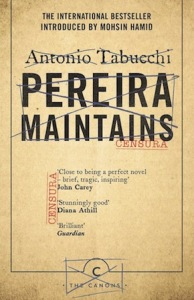 This is a novel about a solitary little man in a police state. We do not realise that at the start of the book – this is part of its charm. Everything happens with slow impendingness. The fact that Portugal too had a fascist dictator for many years is hardly part of British awareness. But I remember in the sixties, when I first went to Lisbon with a photographer to take pics for my advertising agency (we had the Kodak account), we were warned by our Portuguese contact not to talk about politics in public. In this novel, the police presence is pervasive but we do not see them everywhere. We feel them. The walls bristle with ears. Pereira lives in this place under this condition. He follows an uneventful routine in his life, so he could hardly come to harm. He is retired. He potters about in the morning, then he goes out to lunch. He always has a cheese omelette in the same cafe every day. He is aware that the omelette is bad for him. It is making him fat. He has a little heart condition. Gradually he becomes aware that a pretty girl and her boyfriend are seeking his company. He is flattered, though slightly alarmed. They take him out for a drink in the sort of young and noisy bar he does not normally go to. He sees more of them. One day they ask him to do something for them, which he undertakes. It seems harmless enough but he winds himself imperceptibly into trouble. At the end, he – the least harmless of people – is arrested. We realise now that the whole novel is his police statement: Pereira maintains. Read it!
This is a novel about a solitary little man in a police state. We do not realise that at the start of the book – this is part of its charm. Everything happens with slow impendingness. The fact that Portugal too had a fascist dictator for many years is hardly part of British awareness. But I remember in the sixties, when I first went to Lisbon with a photographer to take pics for my advertising agency (we had the Kodak account), we were warned by our Portuguese contact not to talk about politics in public. In this novel, the police presence is pervasive but we do not see them everywhere. We feel them. The walls bristle with ears. Pereira lives in this place under this condition. He follows an uneventful routine in his life, so he could hardly come to harm. He is retired. He potters about in the morning, then he goes out to lunch. He always has a cheese omelette in the same cafe every day. He is aware that the omelette is bad for him. It is making him fat. He has a little heart condition. Gradually he becomes aware that a pretty girl and her boyfriend are seeking his company. He is flattered, though slightly alarmed. They take him out for a drink in the sort of young and noisy bar he does not normally go to. He sees more of them. One day they ask him to do something for them, which he undertakes. It seems harmless enough but he winds himself imperceptibly into trouble. At the end, he – the least harmless of people – is arrested. We realise now that the whole novel is his police statement: Pereira maintains. Read it!
10. ‘The Sun Rising’ by John Donne
Busy old fool, unruly sun,
Why dost thou thus,
Through windows and through curtains call on us?
Must to thy motions lovers’ seasons run?
Saucy, pedantic wretch, go chide
Late school boys and sour ’prentices,
Go tell court hunstmen that the king will ride,
Call country ants to harvest offices,
Love all alike, no season knows nor clime,
Nor hours, days, month, which are the rags of time…
In that the world’s contracted thus.
Thine age asks ease, and since thy duties be
To warm the world, that’s done in warming us.
Shine here to us, and thou art everywhere;
This bed thy center is, these walls, thy sphere.
Time, in the shape of the sun, is the not so hidden influencer in this poem. The poet wants time to stop and does everything his metaphysics will permit to reason with it and make it stay, but he knows it’s a hopeless struggle. Injurious time, as Shakespeare calls it, fickle and unfaithful time, time like a fashionable host, greeting the new, and letting the old moment muddle out into the street. Of course, its very fleetingness gives time its own especial poignancy. It sauces the present with a bright sprinkle of unrepeatable relish. This wonderful moment of love is going to slide away. We can’t hold it. We can only hold each other. And time’s at work there too. All the pathos of the transitory nature of life is summed up for me in the dotty strangeness of finding these lines of Donne’s poem spelt out in wrought iron letters in the garden of the cottage owned by Derek Jarman, that gay and wayward genius whose presence lingers on the shingle beach at Dungeness where the children’s railway from Folkestone comes to an end outside the power station. Words written in rusting iron on what looks, in my memory, like a huge bed’s end, and rightly so if it does.
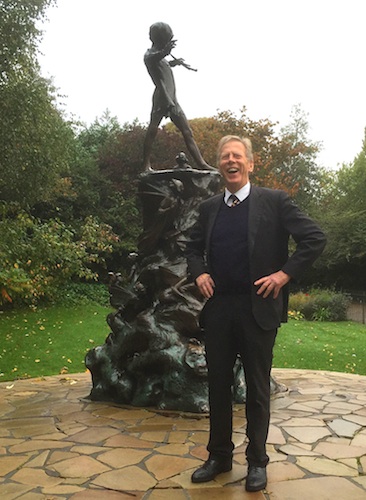 Nick Salaman is the author of many acclaimed novels including The Frights and The Garden of Earthly Delights as well as plays for stage and television. He was born in Somerset and educated at Radley College and Oxford University. He is married and lives in west London. His latest novel The Experimentalist, a gripping tale of family mysteries, stolen identity and oppressive control, is out now in paperback from The Dome Press.
Nick Salaman is the author of many acclaimed novels including The Frights and The Garden of Earthly Delights as well as plays for stage and television. He was born in Somerset and educated at Radley College and Oxford University. He is married and lives in west London. His latest novel The Experimentalist, a gripping tale of family mysteries, stolen identity and oppressive control, is out now in paperback from The Dome Press.
Read more
@DomePress

